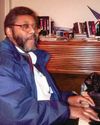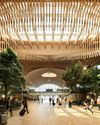CATEGORIES
Categories
Latest Stories

The Knicks endeavor to survive West Coast trip without Brunson
A worst-case scenario, or close to it, happened to the Knicks last Thursday just one game into their current seven-day, five-game West Coast road trip.

Women's basketball enters its golden age with soaring popularity
Division I college basketball is heading into March Madness, which women’s hoops now officially uses (prior to 2022 the term “madness” was men only).

‘Vibe Check’ hosts discuss their perspectives on current era
For the “Vibe Check” podcast hosts, Black history is celebrated in every episode. At the Amsterdam News, every month is Black History Month.

'Ghosts' is haunting, exquisite theater at Lincoln Center
I just experienced an exquisite theatrical work, as I sat in the Mitzi E. Newhouse Theater at Lincoln Center and saw “Ghosts.”

Roy Ayers, 'the Soul of Jazz,' dies at 84
Roy Ayers, the vibraphonist, composer, and record producer whose groove pushed jazz to its soulful outer limits of hipness, inspiring a legion of hip hop artists to sample his huge catalog of music, particularly his hit “Everybody Loves the Sunshine,” died on March 4 in New York City. He was 84.

Thoughts on Wellness
Ramadan Mubarak to my Muslim family. We Christians are on a Lenten Journey that ends at Easter, April 20. Passover begins April 12. These Holy Days make me wonder what it means to live Holy lives; what does it mean to be whole? Sacred. Connected to Source. Loving neighbor and self. Do we want to be holy and whole? Do we want to be well?

Gwynne Wilcox rejoins NLRB; agency thwarts Trump for now
When the new Trump administration removed Gwynne Wilcox from the National Labor Relations Board (NLRB) on Jan. 27, it effectively incapacitated the agency.

Cuban doctors in Caricom are not 'trafficked'
Earlier this month, U.S. Secretary of State Marco Rubio announced plans by the Trump administration to take action against Caribbean governments and officials linked to Cuban medical brigades working in the region.

State prison crisis hits home with young Harlemite Messiah Nantwi's death
Prison reform advocates rallied outside Harlem’s Adam Clayton Powell State Office building last Friday, Mar. 7, after another Black New Yorker’s recent death in state prison. Early reports suggest “extremely disturbing conduct” probably was the cause of 22-year-old Messiah Nantwi being killed at Mid-State Correctional Facility earlier this month, according to Gov. Kathy Hochul.

Black church leaders call for 40-day Target Boycott over $250M DEI demands
A call for economic resistance rang out from Antioch Baptist Church, where faith leaders gathered to launch a 40-day boycott of Target.

Women's inspirational stories highlight the United Airlines NYC Half
Shaunta-Mae remains determined as she makes final preparations to participate in this Saturday's United Airlines NYC Half, a New York Road Runners (NYRR) event widely recognized as the world's premier half marathon.

Panel to look at Black Church in fight for justice
Narratives about the Civil Rights Movement of the 1950s and ’60s often highlight the influence of the Black church, especially the role played by Dr. Martin Luther King, Jr., who co-pastored Atlanta, Georgia's Ebenezer Baptist Church with his father and later served as the minister at Montgomery, Alabama's Dexter Avenue Baptist Church.

Figure skater Maé-Bérénice Méité works to grow her place in history
It took French figure skater Maé-Bérénice Méité a long time to see herself as a part of history.

Bronx Health Center unveils $2.6 million renovated facility
Leadership and clinic staff of nonprofits Acacia Network and La Casa de Salud gathered in the Bronx on Feb. 19 for a ribboncutting ceremony at Clay Avenue Health Center’s $2.6 million renovated facility.

Lauryn Hill, Stevie Wonder delight at Roberta Flack's 'Celebration of Life' memorial
A public memorial service bursting with music, including planned performances by Stevie Wonder and a surprise one by Lauryn Hill and Wyclef Jean of the Fugees, celebrated the life and legacy of the Grammy-winning singer and pianist Roberta Flack.

Harlem Arts Alliance and Manhattan Theatre Club donating books to Harlem Hospital
Last week, Harlem Hospital announced a book drive in collaboration with Harlem Arts Alliance (HAA) and Manhattan Theatre Club (MTC). This partnership is the latest arts initiative between the HAA and the hospital to serve the community.

Nets guard Keon Johnson making the most of his opportunities
Injuries, in addition to trades and other roster fluctuations begets surprising opportunities. Arguably, no other Brooklyn Nets player has taken advantage of the aforementioned circumstances more than fourth-year guard Keon Johnson.

The Roots, Sista's Place, Birthdays At Dizzy's, Blue Note
Brief interludes of the Roots' musical creativity are seen nightly — they're the house band on NBC's \"The Tonight Show Starring Jimmy Fallon.\" The band was originally formed in 1987 by drummer Ahmir \"Questlove\" Thompson and spoken word artist and singer Tariq \"Black Thought\" Trotter, who were classmates at the Philadelphia High School for the Creative and Performing Arts.

AmNews columnist Carol Weaver dies
Carol Maria Weaver, who wrote the Amsterdam News “The Lash and the Cross” religion column in the 1980s, died peacefully at home, surrounded by family, on January 17, 2025, after a brief hospital stay.

New law reveals NYPD stops more Black NYers using low-level encounters
The appropriately named How Many Stops Act recently revealed just how many stops the NYPD conducted last year since the law went into effect: The department documented 1,185,728 investigative police encounters between July and December 2024. That's an average of 6,310 a day.

A 1964 boycott fought school segregation, but inequality continues
During the civil rights era, Black and Puerto Rican New Yorkers were frustrated with the constant claims of racial equality in the North. One look at public school systems, including New York's, revealed that the educational inequities for their children didn't look much different from down South.

Lawsuit challenges transport of immigrant detainees to Guantánamo
The Trump administration's continued deportation of immigrants to the U.S. naval base and detention center on Guantánamo Bay, Cuba, is being challenged by a group of civil rights organizations.

TOP TEN
“I WOULDN'T WANT TO COME HERE, TO BE honest” is not the first tourism slogan that would occur to most marketers.

Robinhood
For helping Sherwood Forest help itself

Homecourt For adding luxury to sustainable, nontoxic household products
CLEANING YOUR home is hardly a sexy undertaking. But when you’re obsessed with design, cleanliness, and things smelling good, it can be joyful.

HistoSonics
FOR CHANNELING SOUND TO DESTROY LIVER TUMORS

Port of Portland
For creating a truly local airport

Liquid Death
FOR GIVING THE BRAND COLLAB NEW LIFE

Wonder
FOR RETHINKING HOW FOOD DELIVERY WORKS, FROM THE BOTTOM UP

Crunchyroll For turning anime fandom into an ecosystem
BEING A FAN OF ANIME IN THE aughts meant you either had to know Japanese or rely on the kindness of internet strangers, who would up- load their own subtitled versions of popular series to video-hosting site Crunchyroll, which launched in 2006. In the nearly two decades since, anime has crossed from subculture into mainstream pop culture among Western audiences, with Crunchyroll leading the way.
